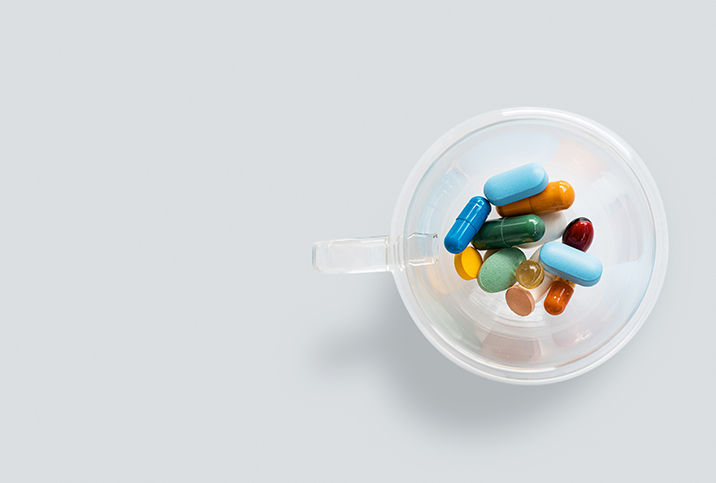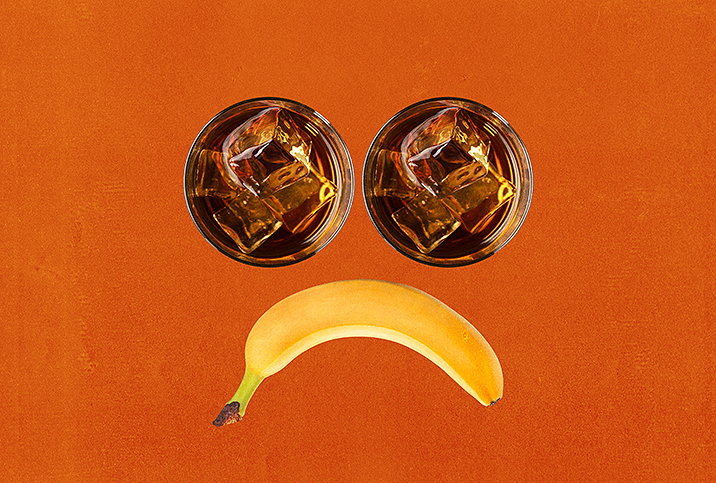Move on From These Holiday Habits and Prepare Your Sex Drive for 2025

The holiday spirit gets many people "in the mood," according to an international study published in 2017 in Scientific Reports. But that's not the case for everyone. Just as the season isn't universally merry and bright, some folks find it far less sexy than others.
That's because—besides the logistical dilemmas of a possibly packed schedule and a full house—the holidays can bring about stressors and lifestyle changes that affect desire and sexual satisfaction. If you feel like your libido has taken a hit, here are five reasons for it and how to get your groove back come January.
Alcohol
Downing a few drinks may make it easier to approach a stranger in a bar, but imbibing too much could present challenges in the bedroom. In small amounts—less than two drinks a day—drinking may enhance arousal in men, said Darshan Patel, M.D., an assistant professor of urology at University of California San Diego Health in La Jolla. But drinking to excess can have the opposite effect, diminishing both libido and sexual satisfaction.
Patel explained that's because alcohol suppresses the central nervous system.
Overdoing it can also contribute to erectile difficulties, which could diminish confidence and desire. Drinking too much repeatedly could lead to a host of long-term issues, with research indicating that about 72 percent of alcohol-dependent men experience sexual health problems.
Having a few more cocktails than usual during the holidays probably isn't cause for concern, but if your drinking habits are interfering with your day-to-day life or continue into the new year, talk to your doctor.
Diet
As with alcohol, moderation is key when it comes to holiday treats such as cookies, candy and dishes high in saturated fat.
Though you might not feel very sexy after chowing down on a holiday smorgasbord, it's unclear whether consuming too much food over a couple of days could affect libido immediately, said Michael Werner, M.D., the medical director and founder of Maze Men's Sexual & Reproductive Health, based in New York City and Purchase, New York.
However, Patel said it is clear that consistently eating a diet high in processed sugars and saturated fats can negatively affect libido and erections. Conversely, a healthier diet generally leads to better cardiovascular health, which translates to better sexual health, according to Werner.
Werner added that men who are overweight are at higher risk of sexual difficulties because fat contains an enzyme, aromatase, that facilitates the conversion of testosterone to estrogen. Heightened estrogen and diminished testosterone levels may cause a variety of issues, including erectile dysfunction (ED), low libido, depression and fatigue, according to Cleveland Clinic.
Exercise
Cardiovascular health is essential to sexual health, so it makes sense that a lull in your exercise routine can affect your sex drive. Exercise increases blood flow to the genitals, which can boost erectile function and libido, explained Hana Patel, M.B.B.S., a general practitioner and mental health coach in London.
Exercise can also alleviate stress, anxiety and depression, all of which can impede sex drive.
Generally, the healthier you are, the better your libido and sexual satisfaction will be, Werner said. Skipping the gym can also affect libido if putting on a few pounds or losing muscle tone affects your self-confidence.
"Men are very visual, even for ourselves, and we find this with women, too. If people are not feeling good about their bodies, even if their partner would find them very attractive, their libidos go down," Werner explained.
Stress
Even if you've maintained a moderately healthy routine, your libido might still decrease during the holidays due to stress. It could be caused by a hectic schedule, financial pressure or spending too much time with family. Stress increases cortisol production and decreases testosterone production, which can reduce sex drive and make it more challenging to achieve and maintain an erection.
"Any kind of stress is not going to have a positive effect on libido, and for men, erections, and for women, orgasmic potential," Werner said.
Depression and anxiety
While largely outside your control, depression, anxiety and loneliness can also affect your sex drive and performance during the holidays. So, too, can seasonal affective disorder (SAD), which causes depressive symptoms during specific times of the year—most commonly, winter.
"We know a lot of people—almost paradoxically but not surprisingly—become depressed and lonely and anxious over the holidays. So that, of course, does have a significant effect on libido and sex," Werner explained.
How to get back on track in the new year
No matter whether you went too hard during the holidays or languished through the past few months in a deep depressive state, it is possible to get back on track.
Talk to your doctor first to determine if any underlying health conditions could be contributing to diminished sex drive. If low testosterone is an issue, for example, hormone replacement therapy (HRT) could be an option. If SAD is keeping you down, a doctor may suggest light therapy, medication, counseling or a combination of treatments.
Werner noted that physical changes associated with aging, and changes in your relationship dynamic, might also affect libido, though, in those cases, the effects are likely to linger into the new year. In this instance, counseling—or at least having an honest conversation with your partner—can be beneficial.
Once underlying conditions have been addressed or ruled out, adopting or readopting healthy habits can help.
Hana Patel recommended eating a balanced diet with plenty of foods rich in flavonoids, such as blueberries and citrus fruits, which research suggests could reduce the risk of erectile dysfunction. She also suggested trying a Mediterranean-style diet, emphasizing plants, fish and healthy fats while limiting or eliminating red meat and processed foods. Research has shown that such diets can positively affect sexual and cardiovascular health, among other benefits.
Exercising regularly—at least 30 minutes per day, five times per week, according to recommendations from the Centers for Disease Control and Prevention (CDC)—can significantly impact both physical and mental health.
So, too, can taking measures to reduce stress, such as setting boundaries, prioritizing sleep and practicing relaxation techniques such as yoga, deep breathing or meditation.
If you need some help to get back on track emotionally or physically, you shouldn't hesitate to talk to a professional. Telehealth services are more prevalent than they've ever been, with video visits and phone appointments taking some of the awkwardness out of the initial meeting. Giddy telehealth makes it easy to get connected to a qualified healthcare professional who can help with a variety of conditions.


















